BEIRUT: The 11th meeting between President Michel Aoun and Prime Minister-designate Najib Mikati on Tuesday showed promise for eliminating the obstacles hindering the long-awaited formation of a government in Lebanon.
Following the meeting, Mikati said: “We still have a few meters left in the race, and I hope we can eliminate the remaining obstacles in a decent manner that suits everyone.
“Everyone is seeking to form a government, because if we do not, it would be a sin against the nation.”
He added: “The dialogue has been positive, and we hope that a government will be born soon. We are working hard to eliminate all obstacles. The formation of a government in Lebanon is much like a complicated math problem that starts with calculating the representation of sects, regions and political parties and ends with people’s allegiances.”
Mikati claimed he received the support of former premiers, including Saad Hariri, who recently resigned, after nine months of fruitless efforts to form a new administration.
Mikati said on Monday that talks with Aoun would “mainly focus on naming the ministers.”
Talks between Aoun and Mikati are being fueled by US and French pressure and the suffocating conditions that the Lebanese have been living in.

Pharmacists hold signs reading in Arabic ‘no gasoline = no ambulance’ and ‘no electricity = no hospital’ as they protest in Beirut, denouncing the critical condition facing the country’s hospitals. (AFP)
Elsewhere, an argument on Tuesday at a gas station in Kafaat, Beirut’s southern suburbs, developed into a heavy firefight.
The Lebanese Army intervened, arresting some of the shooters and settling the dispute.
FASTFACT
Last week, the central bank announced it could no longer finance imports of gasoline and diesel at heavily discounted exchange rates, effectively ending a subsidy scheme.
The station was set ablaze after a B7 rocket-propelled grenade was fired at it by members of Zaiter family, who are protected by the dominant forces in the region and supported by Hezbollah and the Amal Movement.
While rows over the limited supply of fuel blaze on, the army has been carrying out raids in search of subsidized gasoline and diesel that distributors have been hoarding to be smuggled to Syria or sold on the black market.
The army raided a depot in the industrial city in Zouk Mosbeh and seized 65,000 liters of diesel and 48,000 liters of gasoline. The fuel was later distributed for free to the hospitals and bakeries in the area.
A fuel tanker was also raided in Wadi Hunin in southern Lebanon, where the army seized over 47,000 liters of gasoline.
Security forces also seized more than 70,000 liters of gasoline, hidden inside tanks and cisterns in an abandoned zone on the road leading to the airport, in addition to other quantities that were hidden inside a sand plot in the same area. The seized fuel was distributed to hospitals and owners of private generators.
The power crisis has worsened amid the severe shortages of gasoline, forcing dozens of private generator owners to scale down or completely cut supplies, with Lebanon’s state-owned electricity company providing less than one hour a day. Most regions have plunged into darkness and hospitals have intensified appeals for diesel supplies to be able to continue operating.
Head of the Syndicate of Private Hospital Owners Suleiman Haroun said “the seized fuel distributed to hospitals is not enough because hospitals require 350,000 liters of diesel per day to operate.”
But positive signs regarding the diesel importation issue emerged on Tuesday, where it was reported that Lebanon’s central bank had approved financing for two fuel shipments at the subsidized rate of 3,900 Lebanese pounds to the dollar. The two shipments contain 80 million liters of diesel that would suffice the market for five to six days.
The Lebanese parliament will convene on Friday to discuss a strategy for dealing with the fuel crisis.
Speaker Nabih Berri called the session to discuss “appropriate action” over crippling fuel shortages.
Last week, the central bank announced it could no longer finance imports of gasoline and diesel at heavily discounted exchange rates, effectively ending a subsidy scheme, surrendering the Lebanese to a sharp increase in prices.
The bank’s governor, Riad Salameh, has been at odds with the government over the move, claiming that it should only have been done after the provision of prepaid cash cards for the poor.
Salameh has said he can resume subsidizing imports only if a law is passed allowing him to dip into the mandatory reserves.

























